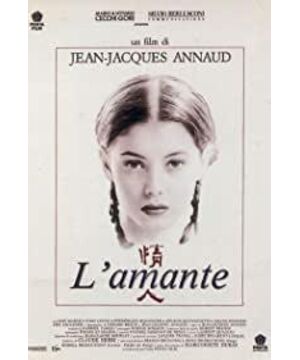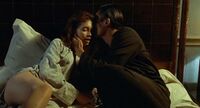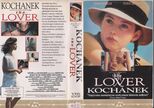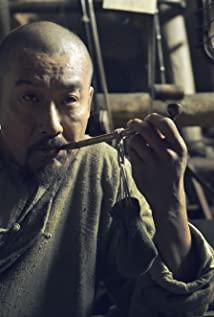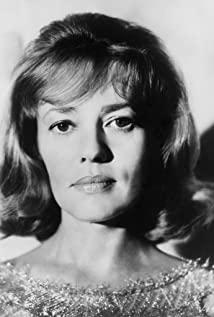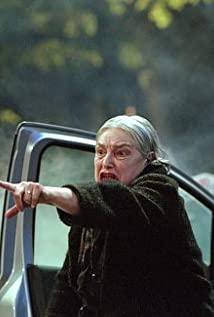The film is based on the novel of the same name written by Marguerite Dura, the most famous female writer in contemporary French literature. Dura, who was born in Indochina in 1914, wrote the autobiographical novel "The Lover" based on an early love affair, which has been translated into 43 languages. According to the statistics of the Paris Spring Book Salon in 1992, 8.5 million copies of "The Lover" have been published around the world. In 1984, the book won the Goncourt Literary Prize and was listed as one of the top ten best novels in contemporary France.
Until 1984, Margaret Durra, who has been writing constantly, kept a close eye on her past, and little was known about her two unhappy marriages and the birth of a son. Forty years ago, she published her debut novel, The Brazen, about members of her own family, but it was signed by Marguerite Donadieu. The characters in the book are almost identical to those in The Lover, which she wrote 30 years later, except that the story takes place not in Indochina, but in the provinces of mainland France: an overworked, domineering mother leads her family with her. He moved to the Dordogne, his handsome brother lost his wife, was weak-willed and turned into a hooligan, and abused his little sister named Proud, this innocent and attractive little girl is Marg in "The Lover" Ritter herself. Dura was the pseudonym under which she later published "The Quiet Life," a name that has become well known around the world. Some people think that "The Lover" is the author's nostalgic work in his later years, which is naturally a misunderstanding. In fact, as the author said at the premiere of the release of the film "The Lover", the shadow of her mother and brother had always loomed over her rough love life, and she had to repeatedly write about them and whip them in order to keep them in her heart. Gloomy dispel. Perhaps this is the original intention of Doula to write "The Lover".
Today's Margaret Durra is not only a master of French literature, but her plays also often cause a sensation, and she is a pivotal figure in the French film circle. The representative of the "New Fiction School" was never satisfied with the path she had taken, and Margaret, who was constantly surpassing herself, tried to come up with a three-in-one literary and artistic style of "novel-drama-movie": both It has the readability of novels, the audibility of dramas, and the visibility of movies and TV. Her works not only pay attention to the ups and downs of the plot, but also pay attention to the high tension of the characters' dialogue, and pay more attention to the picture effect of each paragraph. Pursue a narrative that is like poetry, dialogue is like a play, and the plot is picturesque. It is easy to spot that she uses the montage technique to structure her novels. When Dora's novels written using stream-of-consciousness techniques are adapted into films, she uses unskilled editing techniques to structure the films, which is not difficult, because her novels always contain a lot of film elements. In 1958, her screenplay "Hiroshima Love" was screened by Alain Resnais and won the 1959 Cannes International Film Jury Prize. In 1961, she wrote "A Long Parting", directed by Henri Gubier, which was a success and won the Palme d'Or and the Louis De Luc Award at the Cannes International Film Festival that year. Since 1965 she has written and directed a series of films: "Music", "Trucks", "Nadalie Granary", "Atlantic", "The Ganges Woman", "She in Desolate Gal The name of each is "Venice", "Parksdale", etc. and the most literary and monologue style "Song of India". She portrays emotionally alienated and ordinary people trying to escape their loneliness through intense inner monologues, dialogues, and eloquent voice-overs. The hero and heroine in "The Lover" are representatives of such characters.
The director of the film, Jean-Jacques Arnault, is not only a young man who deliberately seeks new ideas in subject matter, but also an ambitious rising star who is one of the few in France today with a rigorous style. Arnold, who graduated from the French Film Academy in 1967, has always aimed his works at the international film market. His first feature film "Sing to Victory" won the Oscar for Best Foreign Language Film. Launched in 1981, "War of Fire" is themed with the invention of fire technology and the origin of sex by prehistoric human beings, depicting a picture of the primitive life of human ancestors. This film and the football-themed "Impulse" and the 1988 "Bear" were all huge successes in Europe and the United States. Arnold's films are distributed internationally without language barriers, and films in the same language can be screened everywhere without translation. Because Arnold, who aimed at the American market, knew that the majority of American audiences neither liked English subtitles but hated dubbed productions. Therefore, with the support of producer Claude Berry, he made "The Lover" into an English dialogue film. .
Arnold believes that the golden age (1950s-1960s) in which literary theories and art masters emerged in this century is over. Since the 1970s, no one has spoken in the theoretical circle, and the famous directors have run out of talent and can no longer make new tricks, so the Western art world has been silent. Telling stories to audiences like an omniscient and omnipotent God only has an almost naive interest in American audiences who like comic strips like Superman and Star Wars, so a new path has to be found. He found that Margaret Durra's way of narrating herself to readers or viewers affectionately, intertwined personal memories with fiction, and used deconstructed short narratives to be unique, so he decided to put "The Lover" on the screen. He is well aware that the "I" in the original work is not a closed subject, and Margaret Durra has repeatedly claimed that "the history of my personal life does not exist in the novel", and the works of postmodernism are not for the The search for a certain truth thus gave Arnold's creation an infinitely broad space. In the weightless state of Western film circles, they believe that "life is unbearable frivolity" and are looking for new "games". Arnold's work exploring the meaning of life is like a ray of breeze in the heat of summer.
In order to reproduce the original historical appearance of Indochina in the 1930s, the director of the film rebuilt the buildings and houses in Saigon, rebuilt roads, and transplanted flowers and trees. Another old-fashioned cruise ship was bought at a high price from the United States. In order to choose the actors and actresses for the leading roles, Arnold and his countless scouts have traveled almost all over the world. Of the more than 7,000 actresses who applied for it, he didn't like it. Finally, in a fashion magazine "Seventeen", he discovered Jane Marsh, a British girl of Eurasian descent. Margaret Durra herself felt that the 18-year-old model had many similarities with her Girls' Generation. The 120 million franc film is a super-production in France.
"The Lover" is the first sentimental romance film directed by Arnold that depicts a man and a woman's affair and recalls a lost relationship. For this type of subject matter, on the one hand, he avoided filming a lot of vulgar bed scenes for the sake of publicity, nor did he use the eldest brother of the fallen girl as a clue, the red light district of the old French colony as the background, or the homosexuality between the girl and her classmates. The plot works hard (although Dura makes no secret of it in the novel), and then paints a long scroll of exotic erotic images. He uses only a few long shots of Saigon Port and the Mekong River and a few details of the neighborhood to explain where the story takes place. On the other hand, he is not like some "Puritan" films, the most sensitive and sensual bed shots, only shoot above the chest or let the shots disappear into the vibrating mosquito nets. Arnold knew very well that this world-renowned masterpiece is Dura's first-person narration of a French girl who is trying to get out of financial difficulties, starting from committing herself to a wealthy Chinese youth with Europeanization, and going through an unforgettable afternoon. And the next 18 months of continuous rendezvous and germination of love. In that bachelor apartment, the lovers feel the joy of love and the pain and despair brought on by the social background and racial prejudice of their respective families. Therefore, making a good sex scene that is an important part of the story and the driving force behind the development of the plot is the key to the success of this film. Jane Marsh, who was first on the silver stage (this is her changed name, her surname is kept secret), is also soberly aware: "Without these scenes, there would be no film. I was very scared and was shooting the first set of shots. On the eve of I was in the dressing room, I was in tears. But when I found that Tony Leung was shaking like me, I calmed down." The talented director Arnold used the changes of light, different eyes and various Ambient atmosphere to express and describe the desire and impulse of the lovers. This kind of treatment is both real and vivid to give people the enjoyment of beauty without violating the original intention of the original work. Doula also expressed some reservations of satisfaction after seeing it. When she transferred the copyright, she repeatedly warned that her works should not be distorted in any way.
The film has been well-received by experts in the processing of sound: the human voice, acoustics and music, three integral and visual elements of the cinematic aural are harmoniously and subtly intertwined. The sound of the sense of space is very realistic. In the film, the Chinese lover's bachelor apartment is only separated from the outdoors by a curtain, and various sounds of the market can be clearly introduced into the room. According to the needs of the plot, the director made the sound play a role in setting off the real atmosphere. The famous French actor Jeanne Moreau uses her gripping voice-over to make the audience feel constantly changing perspectives through the change of "I" and "She", avoiding the plain and straightforward narrative. The voice-over lines are not only wonderfully edited, but also more touching to read aloud. They not only play the role of threading the needle, but also resemble poetic music. Jeanne Moreau accurately grasped the vein of the protagonist's thoughts and feelings in the works, and gave the corresponding tone of voice, which may be tactful and round, or cold and indifferent, or sweet or deep. , without the slightest pretence. The language skills of this veteran actor from the stage are truly amazing.
The director made the film echo the front and back of the film through the reciprocal letters of the lovers. The cruise ship leaving the port with billowing black smoke symbolizes the complete break of the hopeless love, as well as many unexpected details and a lot of metaphors, but it left the audience with endless aftertastes.
Arnold changed the age of the original Chinese youth from his 20s to 32, and his place of origin from Fushun in the northeast to a province in the south of China. From the point of view of this film, it seems more reasonable. Perhaps it is for this reason that Margaret Dura, who is determined to not forget her old love, wrote another "North China Lover", out of fear that when someone adapts this novel into a movie in the future, she will change her Chinese lover again. She herself adapted it into a screenplay and published it in March 1992.
View more about The Lover reviews


